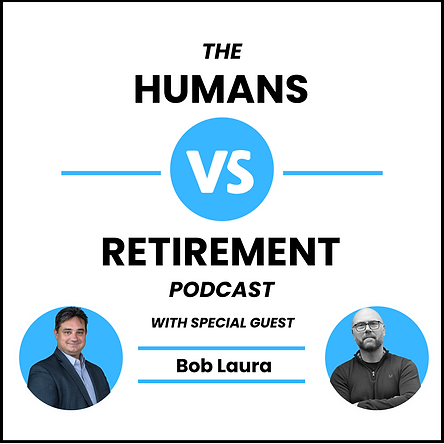.png)
74
How to Build Retirement Intelligence with Bob Laura
Summary
Bob is a pioneer in the psychology and social science of retirement. He is a five-time best-selling author, nationally syndicated columnist and recognised presenter at retirement conferences across the US. He is the founder of the Retirement Coaches Association, Certified Professional Retirement Coach Designation and Retirement Intelligence Assessment. His work has reached millions of retirement readers through seven books, twelve guides, and over 800 articles. In addition to his own writings, he frequently appears in major business media outlets such as the Wall Street Journal, USA Today, CNBC, MarketWatch, the New York Times, and more.
As a former social worker turned retirement expert and author, he has found that retirement is among the most fascinating, yet least understood, phases of life. As a result, he has developed a powerful message to tackle the mental, social, physical, spiritual, and financial aspects of retirement.
In this episode Bob and discuss the common misconceptions about retirement, the rise of grey divorce, and the importance of pre-retirement planning. We also tackle some tricky subjects and highlight the dark side of retirement, including loneliness and addiction, and the necessity of establishing new routines to maintain mental health and social connections post-retirement.
Bob discusses the evolving concept of retirement, emphasising the importance of identity, purpose, and personal fulfilment over financial wealth and he introduces the Retirement Quotient framework, which assesses readiness for retirement through various personal dimensions, including emotional and spiritual well-being.
Key Takeaways
Retirement planning should focus on the individual, not just finances,
Many retirees experience a drop in social interactions.
Pre-retirement planning is crucial for a successful transition.
The 'honeymoon phase' of retirement can lead to disillusionment.
Loneliness and addiction are significant issues in retirement.
Couples often struggle with identity and purpose post-retirement.
Establishing new routines is essential for mental health.
Workaholism can hinder the retirement experience.
Communication between partners is vital for a successful retirement.
Retirement should be planned as a new chapter, not an end. The new wealth is found in work-life balance and connections.
Retirement amplifies who you already are, not who you want to be.
Maslow's hierarchy applies to retirement, focusing on self-actualization.
Retirement requires a proactive framework for success.
The Retirement Quotient assesses personal readiness for retirement.
Understanding personal traits is crucial for retirement planning.
Retirement is an empty bucket that needs to be filled meaningfully.
Mindset and habits are essential for a fulfilling retirement.
Stop waiting for retirement to start living your values.
The only guarantee in retirement is the inevitability of death.
Books Mentioned
Retirement Intelligence – Bob Laura’s book
From Strength to Strength – Arthur Brooks book mentioned in the discussion about workaholism and identity)
The Top Five Regrets of the Dying – Bronnie Ware’s book referenced when discussing regrets and priorities in retirement
The Power of Regret – Daniel Pink’s book talked about in relation to turning regrets into action
Websites & Resources
Retirement Coaches Association – Bob Laura’s organisation focusing on retirement coaching
Bob Laura’s Website – Link to Bob Laura’s official website for resources, blogs, and retirement coaching.
Retirement Quotient (RQ) Assessment – Bob’s online assessment tool for RQ
Harvard Study of Adult Development – The famous study mentioned in the discussion about social connection and longevity.
Other Mentions
Grey Divorce Statistics – The Grey Divorce Revolution: Rising Divorce Among Middle-aged and Older Adults, 1990-2010
Loneliness & Aging Research – Loneliness in Old Age: An Unaddressed Health Problem
Humans vs Retirement
.png)